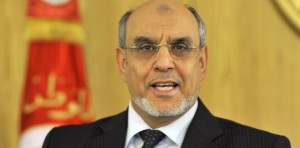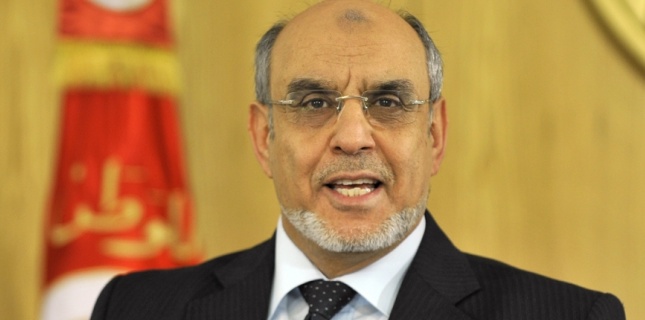
Photo:Tunisian Prime Minister Hamadi Jebali
(AFP\Photo)
(AFP) – Prime Minister Hamadi Jebali was on Tuesday pursuing “another solution” to Tunisia’s biggest political crisis since the uprising two years ago after his plan to form a cabinet of technocrats failed.
Jebali, left out on a limb after his proposals for a non-partisan government were rebuffed by his own ruling Islamist Ennahda party, was to meet President Moncef Marzouki to discuss ways to exit the crisis.
“I will go tomorrow (Tuesday) to the president to discuss the next stages, but I noted progress during the political discussions in terms of seeking a consensus around another solution,” Jebali said late Monday after talks with a raft of political leaders.
The new formula should emerge “in the coming days,” he said.
Jebali first floated his initiative in the wake of public outrage over the killing in broad daylight of outspoken government critic Chokri Belaid by a lone gunman outside his Tunis home almost two weeks ago.
The murder enflamed simmering tensions between liberals and Islamists in the once proudly secular Muslim nation, with Belaid’s family accusing Ennahda of his assassination, a charge the Islamists strongly deny.
The police is still mum over its probe into the murder.
In a terse statement to AFP interior ministry spokesman Khaled Tarrouche said Tuesday that a “serious investigation” was underway. He also said that a Belaid neighbour was arrested after crashing his car into a memorial for the murdered leftist leader overnight Sunday.
Belaid’s killing came after months of failure by the ruling coalition to overhaul the government, and laid bare divisions within Ennahda.
Jebali admitted defeat in his plan to form a new government of technocrats, which he had hoped would be able to overcome the political divisions that have been blamed for igniting Salafist-led violence across the country in recent months.
“I say in all clarity that the initiative I presented — that is to say, a government composed of members not belonging to any political parties — failed to reach a consensus,” Jebali said Monday.
“Another form of government” was still a possibility, he added.
Jebali had vowed to step down if his controversial proposal was thwarted.
But on Monday he insisted that despite its failure, his initiative had at least succeeded in “getting everyone around a table” and in preventing Tunisia “from falling into the unknown.”
His plans had been bitterly opposed by Ennahda hardliners, represented by the Islamist party’s veteran leader Rached Ghannouchi, who are refusing to give up key portfolios and insist on Ennahda’s electoral legitimacy.
The Islamists control the interior, foreign and justice ministries and dominate the national assembly, where they hold 89 of 271 seats.
Ghannouchi said the representatives of some 15 parties had agreed at Monday’s meeting on the need for a government with “political competences” and tasked with holding elections as soon as possible.
“We in Ennahda want to ensure that Jebali continues to chair (the cabinet), and so do all those who took part in this meeting,” he told AFP.
Aziz Kirchen, representing President Marzouki’s Congress for the Republic (CPR), said an agreement had been reached for “the formation of a mixed government” of politicians and technocrats, but without giving details.
The political deadlock has left the country paralysed, said a government official.
“Everything has stopped. The problem is that nobody thinks about the general interest but only of their special interests,” the official told AFP.
The situation was further aggravated with several MPs from Marzouki’s party resigning, and three ministers refusing to work under Jebali.
“Our experience with him has not been successful,” Minister of Employment Abdelwahab Maater told Radio Shems FM.
Tunisian media, meanwhile, poured scorn over the country’s leaders.
The Maghreb daily said: “There are no words strong enough to condemn the irresponsibility of our leaders who are leading the country into ruin.”
As well as the row over the new government, there is deadlock over the drafting of the constitution, with parliament divided over the nature of Tunisia’s future political system 15 months after it was elected.
Since the revolution that toppled former dictator Zine El Abidine Ben Ali, Tunisia has also been rocked by violence blamed on radical Salafists, and ongoing social unrest over the government’s failure to improve poor living conditions.

